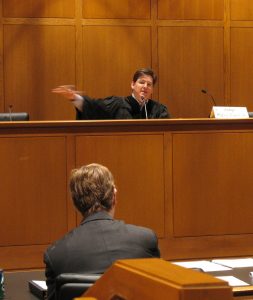Judge Karen Cole of Florida’s 4th Judicial Circuit told a group of young lawyers something many believe but won’t say out loud: Pro se litigants are crazy. Speaking to a group of 50 new lawyers recently, the judge didn’t mince words:
Cole said it’s her experience that people who represent themselves in court generally fall into one of two categories: those who aren’t represented by an attorney for financial reasons and those who are “unbalanced.” “If they’re in the second group, be polite, but don’t expect to build any bridges. If they’re in the first group, think about if you went into surgery not knowing anything about it,” she said.
We’ve all heard it. People go to court without a lawyer and spout a bunch of nonsense. We make ridiculous claims and argue silly legal positions. We represent ourselves with no understanding of the way courts operate or the way judges decide cases. We get angry when opposing lawyers misrepresent the facts and when judges rule against us. Far too often we file motions to disqualify either the judge or the opposing lawyer. Bailiffs stay close, on alert in the event we need restraining. No one is surprised when pro se litigants act like madmen.
Judicial bias is real, and there are reasons for it. The most obvious reason is that judges assume we’re not prepared and they don’t want us wasting the court’s time. They prefer to deal with lawyers who speak their language. That’s one of the hazards of representing yourself in court. This wasn’t always the case. In the early days of the United States, the average free man could go to court without much preparation and ask a judge to address his conflicts with another man. Often, neither party was represented by a lawyer. This was not only common but expected. Judicial bias against people representing themselves was rare.
As time went on, two developments changed this. Lenders got bigger, greedier, and meaner. In the early days, they rarely took their customers to court. When a debtor couldn’t pay, they took a loss and moved on. Now, as part of the business model, banks take their customers to court in droves. So not only are there more pro se litigants in court, many have been dragged kicking and screaming to pay as little as a few hundred dollars. The legal representatives for these companies have the ear of judges, who are disinclined to receive the arguments of self-represented defendants.
In parallel, lawyers have flooded the market for their services. Stephen Magee, a professor of finance and economics at the University of Texas says there are 40 percent more lawyers than needed in the U.S. Yet law schools keep cranking them out, and the legal system accommodates them in ways it doesn’t accommodate pro se litigants. Imagine you’re a judge, and on a daily basis, you see or hear about promising law school graduates who are unemployed. You take the bench for a hearing, and standing next to a group of sharply-dressed young lawyers is a bedraggled self-represented litigant struggling to make an argument. How patient can you be?
Judicial bias exists. And since it does, we as pro se litigants must maximize our knowledge, our preparation, and our persuasive skills to level the playing field. And when we do, we’ll force the courts to respect us no matter how broke or crazy we are.




I read your article on Judicial bias. I am a pro se litigant in my chapter 11. I am also disabled but I can work under medication but I’m also Paralegal and I do know a little bit about the law and I had all my caselaw ready because the roofer was asking for $260,000 in attorneys fees on a roof that was $9160, the judge threaten me several times that he was going to throw me into a chapter 7 and after the creditor Roofer showed the judge that I had made three mistakes I had omitted a couple things out of my bankruptcy. I realize that making mistakes and leaving things out like checking accounts, I left out to that had less than $500 in it by mistake. I was scammed in 1970 on some property in Colorado. That’s worth less than $1500 and I forgot to put that on my bankruptcy schedules and because of all of these mistakes the judge threaten to throw me into a Chapter 7 and he gave the credit or Roofer anything they want it and refused to hear anything I had to say. The judge will not confirm anything less than 100% to the roofer in my plan of re-organization, or he is threaten to throw me into a chapter 7 he has made me so frightened to do anything that I just agree to everything and now I’ve lost my house because I cannot afford to pay the roof for $270,000. The judge was biased from the first time he met me here advised me to get an attorney, but I couldn’t get one in my case because everyone said it was too complicated, so I got totally screwed by this judge who called a hearing, and during the entire hearing what she said was telecast all he did was lecture me about how bad I was.
but she is so much the worse. Counsel can be assigned by her where children are denied constitutional protection (from genital cutting). But from his judge…. sanctimoniousness. Ugly.
broadfork